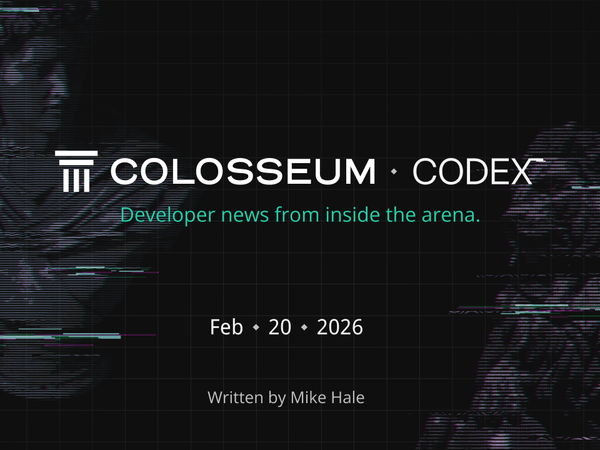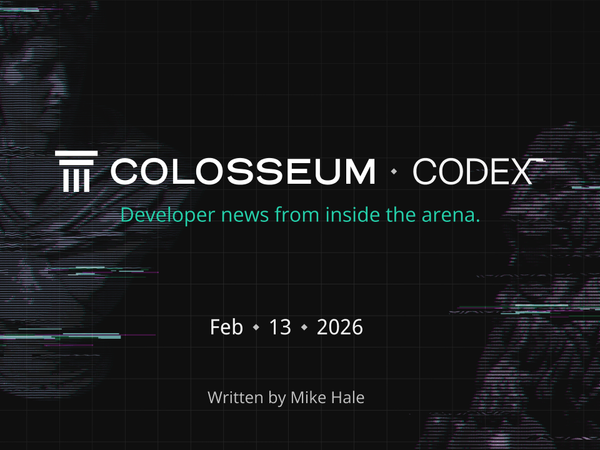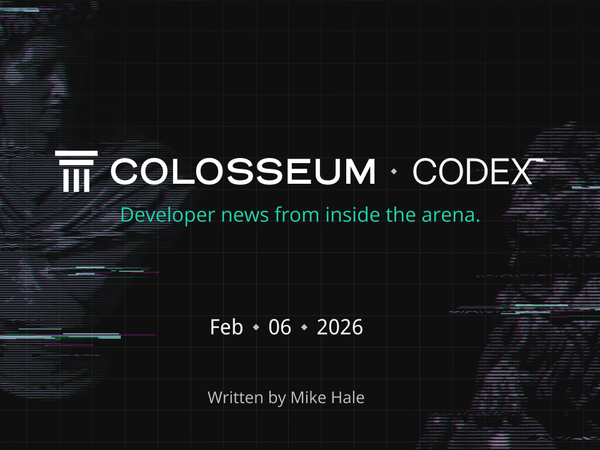Colosseum Codex: Colosseum Alpha Testers, Launch on Solana, MetaDAO Report
Colosseum Alpha Testers, Launch on Solana Hub, Messari MetaDAO Report, Solana’s Next Chapter Report, Solana Constitution and Declaration

Here's what's featured in this week's issue:
- Colosseum Launches an Alpha Testers Program
- Launch is a New Hub for Product Primitives from Solana Foundation
- Messari Report: MetaDAO Self-Enforced Token Holder Rights
- Galaxy Research Report: Solana's Next Chapter
- Community Driven Solana Constitution and Declaration
🧪 Colosseum Alpha Testers
Colosseum is launching an Alpha Testers program, inviting users to test and provide feedback on new products from its growing portfolio of onchain tools.
The program offers early access to experimental features and applications that are shaping the next phase of the Solana ecosystem.
Builders and users interested in participating can apply to join the tester group.
🚀 Launch on Solana
The Launch on Solana initiative provides developers with a set of tools to build production-grade applications on Solana. The goal is to remove technical friction at critical layers of identity, payments, and onboarding, so founders can focus on product.
The latest toolkits offer practical, modular components for wallets, commerce, and verifiable credentials:
- Kora: Enables fee abstraction and custom signing RPCs so that users may transact without needing to explicitly pay fees or manage transaction signing flows.
- CommerceKit: A drop‑in SDK allowing developers to accept Solana‑token payments on websites/apps with minimal code.
- Attestations: A permissionless protocol for verifiable credentials tied to wallet addresses that supports KYC, geographic checks, accreditation, and reputation.
- Solana Pay: An open-standard payments framework enabling instant settlement, negligible fees, and direct wallet‑to‑wallet payments.
To explore each tool in detail and start building, visit the Launch on Solana hub for docs, examples, and integration guides.
🗳️ Messari MetaDAO Report
Messari’s latest research report explores MetaDAO’s evolution from a futarchy experiment to a full-fledged launchpad offering “unruggable ICOs.” MetaDAO’s platform allows founders to raise capital while ensuring enforceable tokenholder rights through onchain governance and legal structures.
For builders, MetaDAO offers a unique alternative to traditional token launches.
Instead of sending funds directly to teams, capital is managed via futarchy-based DAOs, where proposals govern spending. Founders must also transfer project IP to a legal entity governed by tokenholder votes, ensuring transparency.
This is a free report from Messari Research, offering insights for teams considering a fair way to launch a token.
MetaDAO Blockworks Research Report
📘 Solana’s Next Chapter
A new report from Galaxy Research, Solana’s Next Chapter, explores how Solana has evolved from a high-speed blockchain to a platform for Internet-scale financial systems.
Upgrades like Agave 3.0, Firedancer, and the consensus overhaul Alpenglow promise lower latency, faster finality (~150ms), and more reliable validator performance.
Improvements in compute limits, runtime efficiency, and asynchronous execution reduce bottlenecks for building complex apps.
Meanwhile, infrastructure enhancements like DoubleZero and Application-Controlled Execution (ACE) open new design space for custom market logic and low-latency transaction flows.
Solana’s fee and application metrics are now leading across the industry, demonstrating that low-cost blockspace can offer builders predictable economics.
As Solana moves closer to its vision of Internet Capital Markets, there's a real opportunity to build global-scale financial applications.
Solana’s Next Chapter: Laying the Foundation of Internet Capital Markets
📃 Solana Constitution
The Solana Constitution is a community-driven effort led by validators, stakers, and builders to formalize how governance operates on the Solana networkthat aims to establish a shared foundation for decision-making across the ecosystem.
Two documents form the basis of this framework:
- The Solana Declaration: Outlines shared values and long-term objectives, such as permissionless access, user-centric design, open-source development, and economic alignment.
- The Solana Constitution: Defines the operational mechanics of governance. It introduces two proposal types: technical specifications (SIMDs) and governance proposals (SGPs), with different pathways for implementation and voting.
The goal of this proposal is to codify roles and responsibilities for validators, stakers, and a Governance & Execution Council, and establishes parameters like quorum thresholds, vote windows, and override rights.
A key emphasis is placed on transparency, staker sovereignty, and the ability to override validator votes if necessary.
The draft documents remain open to feedback through a series of consultation events that will take place for the remainder of the year.
⚡ Quick Hits
How MetaDAO and Metaplex Are Redefining Token Launches - Solana Floor
Introduction to Trident's VS Code Extension for Solana (video) - @TridentSolana
Solana x402 Workshop (video) - @solana_devs
How to get started with x402 on Solana - Solana
The x402 Solana Hackathon is live - Solana
Helius Releases Orb Solana Explorer - @0xMert_
Wallet Infrastructure for Crypto Ecosystems: Best Practices for 2025 - Para
Introducing the Superteam Talent Scout Program - @SuperteamTalent
Roundup of Cypherpunk Hackathon Projects from Australia - @Hackarooxyz
⚙️ Tools & Resources
javalana is an example of using SBPF Linker to compile java (javacpp) to Solana programs via LLVM bitcode.
Kani is an open-source verification tool that uses model checking to analyze Rust programs to check both safety and correctness of Rust code.
golang-lana is a minimal example of a solana program written in go, compiled to sBPF using sbpf-linker, and deployed to a local Solana test validator.
💸 Funding
Pump.fun has acquired Padre, a multichain trading terminal for professional traders. The acquisition reflects Pump.fun’s strategy to consolidate the memecoin trading stack and offer a platform for retail and pro users.
💀 RIP
Blockworks is shutting down its news division and laying off its editorial staff as it shifts focus toward its data and software business. As part of this move, the Lightspeed podcast, frequently featured in this newsletter, will also be discontinued.
👩🔧 Get Hired
- Phantom is hiring a Senior Software Engineer, Backend
- Bags is hiring a Back End Developer
- Solana Foundation is hiring an Integration Engineer
- BitRobot is hiring a Front End Developer
🎧 Listen to This
web3 with a16z crypto
Each year, a16z Crypto's State of Crypto report analyzes the data to track crypto’s evolution across markets, technology, policy, culture, and more.
Now in its fourth edition, the 2025 State of Crypto report reveals how this once-fringe technology has hit recent all-time highs and gone mainstream, from stablecoins and tokenized assets to rapid adoption by major financial institutions.
This episode digs into the findings and themes from this year’s report, what’s changed since last year, why stablecoins are “suddenly” taking over, and how institutions are embracing crypto technologies.
State of Crypto 2025: The Latest Data, Trends, and Themes Revealed
Follow @mikehale on X or Warpcast!
Thanks for reading ✌️
I hope you found something useful here! If you have any suggestions or feedback just let me know what you think.




